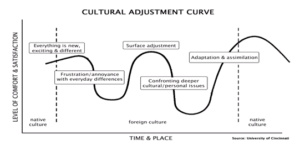What is Culture
We all know what culture means in some sense, but it is helpful to think about it more deeply. The American Sociological Association defines culture as “the languages, customs, beliefs, rules, arts, knowledge, and collective identities and memories developed by members of all social groups that make their social environments meaningful.” In a sense, culture is the lens through which we perceive the world, and it can impact our outlook in ways that we never realize. When you are immersed in a new culture, as on exchange, you become aware of the lenses of the people around you. Consciously or unconsciously, you begin to describe that lens—the foreign culture—and learn things about your own as well. It is quite likely that your perspective will be reshaped somewhat, based on what you learn.
While on an exchange, you will encounter alternative ways to live life and solve problems, which is one of the most exciting and rewarding experiences you will gain. Becoming skilled at functioning effectively in another country prepares you for further transitions in life. Entering another country is not just a geographical shift, but a psychological one as well.
When thinking about culture, it is important to remember a few points:
- All cultures have struggled with the same questions and problems, but they may have come up with different answers and solutions
- No culture is more or less valuable than any other
- Because the core aspects of a particular culture have been passed down for generations, they are not only considered good and proper but natural and normal. This is why conflict and change involving those core values are always accompanied by tension, and frequently lead to miscommunications. When you are immersed in a new culture, you should expect to be uncomfortable some of the time—even when you cannot figure out why.
What is culture shock?
Culture shock is felt by all exchange students, and is a natural response to being cutt off from their familiar ways of communication and interactions. It is a sense of anxiety and constantly feeling overwhelmed by a new environment.
Culture shock is triggered by the absence of familiar stimuli and a different set of social norms that have not yet been understood. This can lead to both physical and emotional discomfort, which can be hard to notice. It can gradually build up over time and challenge a person’s subconscious belief that the way they have always done something, is the only correct way.
Culture shock undergoes five distinct stages:
- The Honeymoon Stage.
This happens right when you get to your host country. You are so excited to be there and meet your host family. You may be excited about school, the food, practicing your language, etc.
- Hostility and Irritability.
This stage comes as you begin settling into a completely new setting. You may feel overstimulated, overwhelmed, frustrated by communication and cultural barriers you are facing, etc. You may also start to feel homesick. All of this is normal!
- Gradual Adjustment.
This is when you start to find your place in your host family and in school and among your classmates. You deepen the relationships you have been forming since arriving.
- Adaptation.
Adaptation is when you finally have your routine, you have overcome some of the language barriers and have started adapting to the new culture. Things may become familiar to you and you are fully engaged with your surroundings.
- Re-Entry Travel Shock.
This is when you come back home. It is often challenging to re-adjust to life back home. You will find that you have changed as a person and that your family and friends may have changed as well. You will be re-adjusting to your place within your friends group and family.
It is important to know that everyone goes through this and that the best thing to do if you are facing culture shock, is to reach out to others. Your host family, host rotary club, country officer here and in your host country, as well as to your friends and other exchange students are all great resources and support systems to help you adjust to your host country and re-adjust back home.
How To Recognize Culture Shock
There are many signs that you may be experiencing culture shock, and these signs can look different for different people.
Common signs include:
- An excessive concern for cleanliness (the sometimes unconscious feeling that what is new and strange is “dirty”—whether that be objects around the house or people)
- A feeling of helplessness
- A desire to spend all of your time with people from your culture (including other exchange students)
- Irritation over minor inconveniences
- Refusal to engage with culture or learn the language
- Not wanting to go to school because classmates are “unfriendly”
- Changes to your diet or sleeping habits
- And many more…
How is Homesickness Related?
Homesickness can be triggered by culture shock and the stress of the sometimes-rocky adaptation to a new environment. Homesickness varies a lot from person to person, both in timing and severity. It might seem logical for homesickness to fade gradually as you become accustomed to your new routine, but there are many trajectories this can take. In general, homesickness peaks shortly after arrival and has spikes of intensity, especially around holidays or other important dates. Homesickness effectively always goes away with time and effort, but those who remain homesick throughout their exchange likely had severe homesickness early on. With that in mind, it is important to jump in with both feet and make an extra effort to develop relationships with your host family, classmates, and others, early in your exchange. This does NOT mean that a bad first host family experience, for example, will cause your exchange to be miserable. The outcome is very much in your control.
How to overcome culture shock and homesickness
The single best way to get over culture shock quickly is to get to know the people of your host country. You cannot do this effectively without knowing the language, because in addition to allowing you to communicate, it is a door into their culture; a lot can be learned about a culture by looking at its language(s). Another way to get to know the people is to participate in as many activities as possible. This could be a festival, a religious rite, a school event, or any number of other activities.
Good coping strategies are active and problem-focused, rather than a vague attempt to focus on “the positives.” It is incredibly helpful to reflect on your cultural lens regularly, and confront the root cause(s) of your homesickness.
Adjustment Tips
- Be aware of the existence of the cultural adjustment process. Realize that it is natural to miss your family, friends, and home. Talk about these feelings with someone you feel comfortable with or someone who has experienced the same feelings in the past. Sometimes students think this only happens to “weak” or “immature” students, but it happens to everyone.
- Stay busy. Get involved in activities, but also continue hobbies and sports that you enjoy in your home county.
- Get some extra rest
- Eat Well
- Maintain your sense of humor. Anyone who has lived in another culture has funny and/or embarrassing stories. You are not alone. Laughing at these situations can ease the tension.
- Keep realistic expectations. It may take longer to accomplish tasks in a new culture, a new academic environment, and a new language.
- Remain open minded, flexible, and adaptable. You will find things that don’t make sense. Remember that you are experiencing these events through your particular cultural lens. It will take some time before you can see through your host country lens.
- Remember that being in a new culture can be confusing. It is often difficult to figure things out on your own. The important thing to remember is to ask questions.
- Call/email home less frequently – talking with your real family and friends back home will make the culture shock more difficult to overcome.
- Do things you enjoy! You will be much happier and more capable of dealing with culture shock
- Ask your counselor for help if needed. Some situations can be extreme and require professional help.


